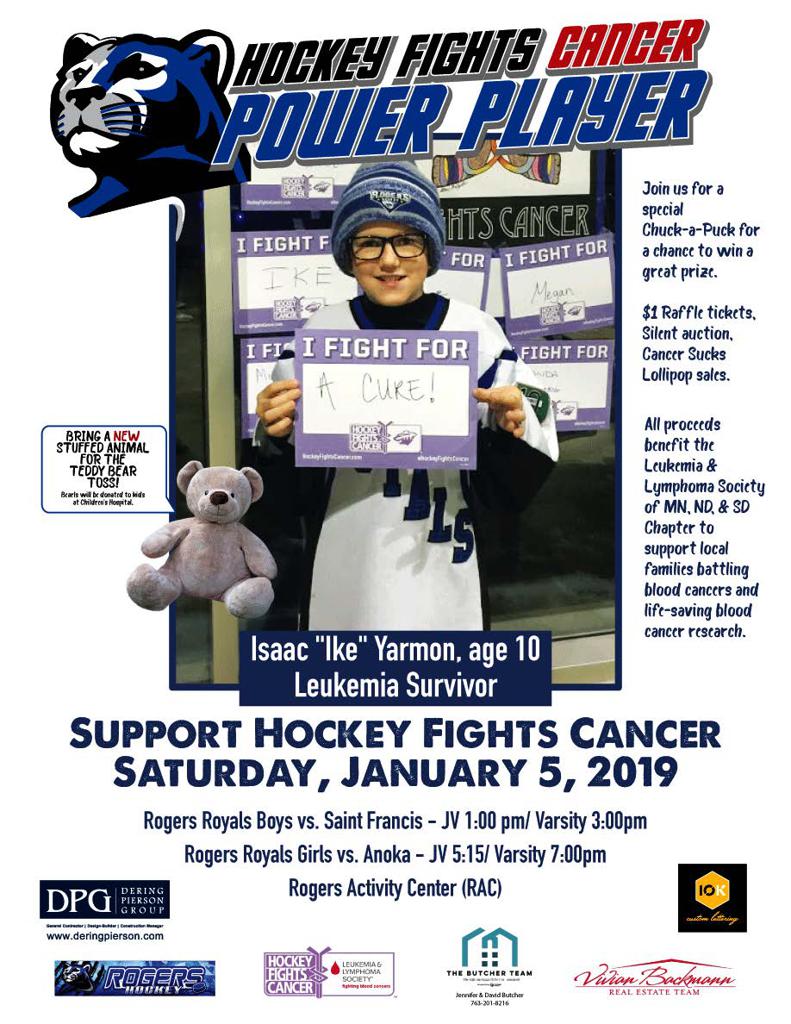Rogers High School Booster Club
Welcome to the Rogers High School Royals Hockey site, home to the Boys and Girls Varsity and JV hockey teams. We will participate in the Mississippi 8 Conference in the 2018-19 season. The Royals will join the Northwest Suburban Conference starting in the 2019-20 season.
The Rogers Royals Face-Off Booster Club provides support to our Rogers Royals Boys & Girls Hockey Programs through fundraising events, sponsorship opportunities and memberships.
GIRLS EVENTS
2/9 - Section Quarterfinals vs Champlin Park/Coon Rapids @ 7:00pm, Roseville Ice Arena
Section 5AA Bracket
BOYS EVENTS
2/14 - Senior Night
2/16 - Student Appreciation Night

HOCKEY FIGHTS CANCER
Thank you to everyone for making Hockey Fights Cancer a huge success once again. It is so great to see all the Hockey communities come together for this cause. The enthusiasm and generosity shown for this fundraiser is very moving and is evidence of the awesome place we live.
Overall we raised $5,607!! We beat last year! Online donations: $3,820 plus the money raised at the event, $1787!!!
All of this money goes directly to the Leukemia and Lymphoma Society of MN, ND & SD. Donations support LLS research, patient services, advocacy, public and professional education, and community services.
The winners of our Team fundraising Contest:
- U10B1 - $850 - Hour of post-season ice time and Pizza Party
- PeeweeB2 - $450 - Team T-shirt from 10K Lettering
- SquirtB1Blue - $350 - DQ Dilly Bars for the team
Thank you to our Signature Sponsors for their very generous donations!
- Butcher Mortgage - MN Wild Jersey Boys Game
- Vivian Backman Real Estate Team - MN Wild Jersey Girls Game
- DPG Construction - XBox Raffle
- 10k Lettering - T-shirt for our 2nd place Team
- Mike Bauer and City of Rogers - Donating Ice time for our First Place Team and support throughout the event
The following donated to our Raffle; please support these local businesses:
Drake O'Neills, Clives, Maynards, Salon Adagio, Touch 'em all Carwash, Urban Air, Sky Zone, Cowboy Jacks, Emagine Rogers Theater, and D. Michael Bs.
An extra Special Thank you goes out to Isaac "Ike" Yarmon for being our honored hero at the Boys Varsity Game. Thank you for teaching us all to be "Tough Like Ike."
RYHA Hockey Fights Cancer Committee
Lois O'Brien - Chairperson, Andrea Pierson, Josey Dooley, Deandra Strouth, Jamie Carlson, Cassie Fitzke

Rogers Hockey Clubs would like to "Thank" all of our sponsors!
Please take a look at our sponsor links on our left side navigation menus
(these will change depending on which page you are on)
or visit our Sponsor Page and all tabs for a full list.
If you have the chance to use one of our Sponsors, please let them know
that you saw their ad on our website.
Thank You.
Most Recent Hockey Articles
Athlete of the Week: Marie Reimer, Rogers hockey
- By Jake Andersen, sports writer 01/12/2019, 11:30am CST
Royals Claim Consolation Title in Schwans Cup
- By Jake Andersen Star News 01/06/2019, 10:00am CST
Scherling Scores 100th Point
- By Jake Andersen Star News 12/22/2018, 6:15pm CST
Royals vs Coon Rapids Game Video
- By Sara Weis 11/29/2018, 4:30pm CST
Royals Girls Undefeated
- By Jared Hines- Star News 11/26/2018, 8:30am CST























